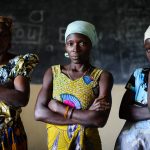Sometimes, success is measured by how firmly you hold the line.
In December 2017, survivors of sexual violence in the Democratic Republic of the Congo (DRC) witnessed a milestone in justice. In a landmark judgment, a mobile court convicted 11 men, including a sitting member of a provincial parliament, of crimes against humanity for raping dozens of young girls in the village of Kavumu, and sent them to prison for life. It was the first ruling of its kind in Congolese history. Physicians for Human Rights (PHR) and our partners were elated that the court held powerful men to account and that the survivors obtained justice.
Just a few months earlier, we had celebrated that the world’s largest organization of psychologists stood up against torture and ill-treatment. The American Psychological Association (APA) reaffirmed its 2015 resolution banning psychologists from participating in national security interrogations and serving at illegal detention sites like Guantánamo Bay. PHR has documented human rights abuses of Guantánamo detainees and exposed how psychologists committed, concealed, and justified torture and abuse of detainees. Since 2005, following the Abu Ghraib scandal, we have relentlessly pushed for a ban on these practices, consistent with the medical ethics of “do no harm.”
But as human rights defenders the world over know, successes seldom go unchallenged. It wasn’t long before both of these landmark victories were contested. The Kavumu verdict was appealed in July 2018, and the APA decision was put to a renewed vote in August 2018 by those seeking a return of military psychologists to Guantánamo.
We in the human rights world fight every day to ensure that our hard-won victories on behalf of victims and survivors are not reversed. Each day we fight to preserve these gains for health and human dignity, and we are careful never to become complacent, even following unambiguous successes. A policy that protects the vulnerable against abuses of power could be adopted today, but summarily revoked tomorrow – sometimes openly, and sometimes in secrecy. Fighting for human rights can sometimes seem like an endless struggle where even as one battle is won, another hard-won gain is eroded.
Given the human rights crises we are witnessing globally and domestically, it has become increasingly evident over the past few years that the human rights movement must embrace an additional metric for defining success: not just moving forward, but securing progress against efforts to move backward; of maintaining gains in the face of escalating disregard for the rule of law, for science, and for evidence. In this shifting paradigm, the tools of law, science, and evidence are even more critical and powerful. Any win must not be taken for granted, but understood as a step forward along the long road that lies ahead.
In July 2018, PHR and our partners exhaled and rejoiced as a DRC appeals court upheld the original Kavumu convictions against lawmaker Frederic Batumike and the militia members he directed. One month later, the APA voted to retain its ban on psychologists at Guantánamo – reinforcing that torture and indefinite detention are unlawful, and that psychologists should have no part in supporting these violations. But any sense of relief is tempered by the knowledge that those indifferent to medical complicity in abuses will not stop.
For every activist who is honored, there is another whose testimony is ignored. For each perpetrator convicted of a war crime, there is another whose massacre is denied. And for each health professional trained to collect forensic evidence, there are many others whose hospitals are bombed. So much of the work done to ensure human rights are upheld is done quietly, and behind the scenes. For this reason, it was especially heartening to see the Nobel Committee award the 2018 Peace Prize to heroes like Nadia Murad, a Yazidi woman and outspoken survivor of sexual violence, and Congolese doctor Denis Mukwege, who treats survivors and who courageously advocates domestically and globally for their meaningful access to justice.
Each of these victories provides inspiration to continue the fight and to ensure that whatever gains are made – whether by a vote, a policy, a resolution, or a ruling – are never reversed, but rather, built upon. They are a constant reminder to human rights activists never to be idle, but to anticipate rollbacks and be ready to fight back with the tools we’ve always used – evidence, facts, and survivors’ testimonies. Because, at the moment, preventing the reversal or rollback of rights is the only way to continue defending established human rights successes.
A version of this article originally appeared on the Oak Foundation’s blog.

